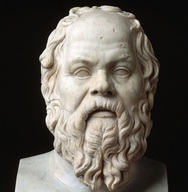APOLOGY
|
|
If we had to pick one text in the entire history of philosophy to have you read, the Apology would definitely be it. The text has it all: a compelling hero (Socrates), a life and death situation (his trial), and one of the most eloquent statements about the philosophical life ever articulated (his speech).
As you read the text, it will become evident that Socrates has very clear ideas about what the philosophical lifestyle demands of its practitioners. That Socrates was willing to face death rather than abandon his most cherished principles also demonstrates just how seriously Socrates took his vocation as a philosopher. |
|
As you read, be sure that you are able to answer the following questions:
Looking to read something else about this topic? Try "Why Socrates Still Matters," (Wisdom's Haven, 2013) Mike Russo's take on the continued relevance of Socrates in the 21st century. If you're looking for a bit of historical background on the period in which Socrates loved, you might try reading "The Fabulous Fifth Century: Athens in the Age of Pericles." |
|
Select one of the following question to reflect upon after having gone through all of the above steps:
|
© Michael S. Russo, 2013. All of the content on this webpage is copyright. The materials on this webpage may not be modified, posted or transmitted without the prior consent of the author. Permission is granted to print out copies for educational purposes and for personal use only. No permission is granted for commercial use.




